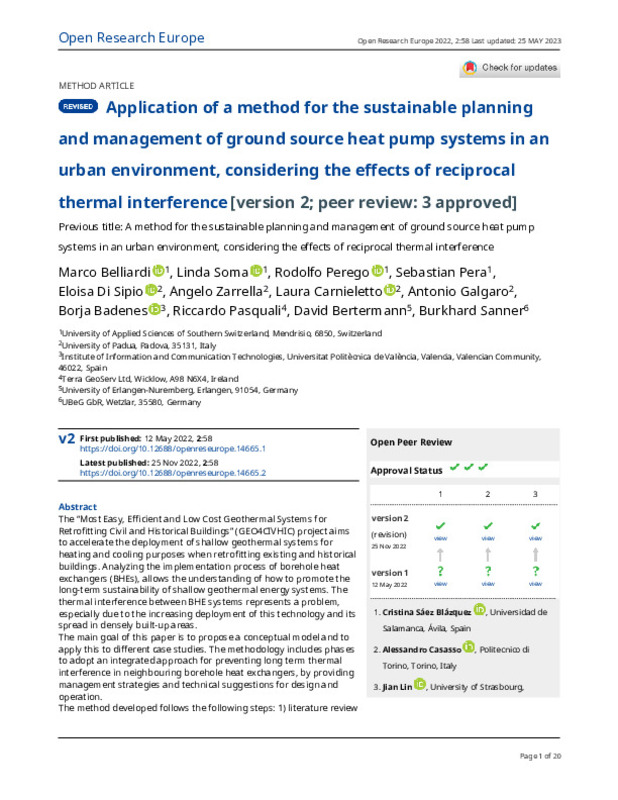JavaScript is disabled for your browser. Some features of this site may not work without it.
Buscar en RiuNet
Listar
Mi cuenta
Estadísticas
Ayuda RiuNet
Admin. UPV
Application of a method for the sustainable planning and management of ground source heat pump systems in an urban environment, considering the effects of reciprocal thermal interference
Mostrar el registro sencillo del ítem
Ficheros en el ítem
| dc.contributor.author | Belliardi, Marco
|
es_ES |
| dc.contributor.author | Soma, Linda
|
es_ES |
| dc.contributor.author | Perego, Rodolfo
|
es_ES |
| dc.contributor.author | Pera, Sebastian
|
es_ES |
| dc.contributor.author | Di Sipio, Eloisa
|
es_ES |
| dc.contributor.author | Zarrella, Angelo
|
es_ES |
| dc.contributor.author | Carnieletto, Laura
|
es_ES |
| dc.contributor.author | Galgaro, Antonio
|
es_ES |
| dc.contributor.author | Badenes Badenes, Borja
|
es_ES |
| dc.contributor.author | Pasquali, Riccardo
|
es_ES |
| dc.contributor.author | Bertermann, David
|
es_ES |
| dc.contributor.author | Sanner, Burkhard
|
es_ES |
| dc.date.accessioned | 2023-09-08T18:01:09Z | |
| dc.date.available | 2023-09-08T18:01:09Z | |
| dc.date.issued | 2022-11-25 | es_ES |
| dc.identifier.uri | http://hdl.handle.net/10251/196143 | |
| dc.description.abstract | [EN] The ¿Most Easy, Efficient and Low Cost Geothermal Systems for Retrofitting Civil and Historical Buildings¿ (GEO4CIVHIC) project aims to accelerate the deployment of shallow geothermal systems for heating and cooling purposes when retrofitting existing and historical buildings. Analyzing the implementation process of borehole heat exchangers (BHEs), allows the understanding of how to promote the long-term sustainability of shallow geothermal energy systems. The thermal interference between BHE systems represents a problem, especially due to the increasing deployment of this technology and its spread in densely built-up areas. The main goal of this paper is to propose a conceptual model and to apply this to different case studies. The methodology includes phases to adopt an integrated approach for preventing long term thermal interference in neighbouring borehole heat exchangers, by providing management strategies and technical suggestions for design and operation. The method developed follows the following steps: 1) literature review to determine what are the main drivers for thermal interference between shallow geothermal systems, in the context of the GEO4CIVHIC project case study sites; 2) to create a conceptual model to limit thermal interference at both design and operational phases; 3) to apply the developed method to real and virtual case studies in countries with different regulatory frameworks and to test its main strengths and weaknesses. The application of this conceptual model to specific case studies provides evidence of critical planning and operational characteristics of GSHP systems and allows the identification of measures to mitigate impacts of thermal interference to be identified. | es_ES |
| dc.description.sponsorship | This research was financially supported by the European Union¿s Horizon 2020 research and innovation programme under the grant agreement No 792355 (Most Easy, Efficient and Low Cost Geothermal Systems for Retrofitting Civil and Historical Buildings [GEO4CIVHIC]). | es_ES |
| dc.language | Inglés | es_ES |
| dc.publisher | F1000 Research Ltd | es_ES |
| dc.relation.ispartof | Open Research Europe | es_ES |
| dc.rights | Reconocimiento (by) | es_ES |
| dc.subject | Geothermal energy | es_ES |
| dc.subject | GSHP | es_ES |
| dc.subject | BHE | es_ES |
| dc.subject | Thermal interference | es_ES |
| dc.subject | Planning | es_ES |
| dc.title | Application of a method for the sustainable planning and management of ground source heat pump systems in an urban environment, considering the effects of reciprocal thermal interference | es_ES |
| dc.type | Artículo | es_ES |
| dc.identifier.doi | 10.12688/openreseurope.14665.2 | es_ES |
| dc.relation.projectID | info:eu-repo/grantAgreement/EC/H2020/792355/EU | es_ES |
| dc.rights.accessRights | Abierto | es_ES |
| dc.description.bibliographicCitation | Belliardi, M.; Soma, L.; Perego, R.; Pera, S.; Di Sipio, E.; Zarrella, A.; Carnieletto, L.... (2022). Application of a method for the sustainable planning and management of ground source heat pump systems in an urban environment, considering the effects of reciprocal thermal interference. Open Research Europe. 2:1-20. https://doi.org/10.12688/openreseurope.14665.2 | es_ES |
| dc.description.accrualMethod | S | es_ES |
| dc.relation.publisherversion | https://doi.org/10.12688/openreseurope.14665.2 | es_ES |
| dc.description.upvformatpinicio | 1 | es_ES |
| dc.description.upvformatpfin | 20 | es_ES |
| dc.type.version | info:eu-repo/semantics/publishedVersion | es_ES |
| dc.description.volume | 2 | es_ES |
| dc.identifier.eissn | 2732-5121 | es_ES |
| dc.identifier.pmid | 37645277 | es_ES |
| dc.identifier.pmcid | PMC10445899 | es_ES |
| dc.relation.pasarela | S\467111 | es_ES |
| dc.contributor.funder | COMISION DE LAS COMUNIDADES EUROPEA | es_ES |
| dc.subject.ods | 13.- Tomar medidas urgentes para combatir el cambio climático y sus efectos | es_ES |








